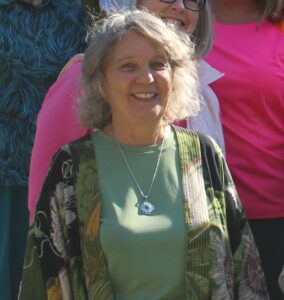Many people come to Healing Transitions to find recovery. Rhonda Spence came to help her son as he sought freedom from addiction. Ultimately, she found her own recovery too.
“I started coming to the family support group when my son was struggling with addiction for the first time,” said Rhonda. “Eventually, I got certified as an Alcohol and Drug Counselor because it seemed like there wasn’t much help for families caught in the middle of their loved one’s addiction.”
While support for addiction and recovery programs has grown in the past decade, there are many family members who don’t know that help is available for them too. And, as Rhonda points out, there can be a lot of shame and guilt surrounding the family member’s addiction. 
“I’m hoping that our family support group will bring awareness that this is a disease,” she said. “It’s not something to be ashamed of. Everyone needs help, but a lot of people struggle alone.”
Rhonda brings a unique perspective to the weekly, 90-minute family support group sessions because of her own experience with her son’s addiction. As a parent of a child who battled with addiction, and now as a family support specialist at Healing Transitions, Rhonda says every parent and child is going through their own journey, and every path to recovery is different.
“What we recommend for each family is very individualized, depending on the dynamics of their relationships,” she said. “Sometimes, parents will meet with me one-on-one to talk through what they’re facing.” Sometimes the whole family will meet with me to discuss options.
“I try to bring something different to the group every week. Sometimes we watch a video, sometimes people just start talking and sharing about what they’re going through. For everyone, there’s a process of letting go instead of trying to fix their child,” she shared.
While there’s no one-size-fits-all path forward for every family (or family member), Rhonda encourages widespread family involvement.
“The more family members that are involved, the higher the chance of success with the entire family,” she said. “We had a sister-in-law who contacted us because her brother-in-law was living in his parent’s house drinking all day. The whole family met with us, and they agreed that he couldn’t continue to live at their home and needed to come to Healing Transitions. He’s in our program today.”
That’s the ripple effect of recovery.
If there’s one thing Rhonda would tell loved ones considering coming to Healing Transitions’ family support meetings, it’s this: “There’s support, love, and encouragement, and other people are going through this too. It’s important to put yourself first. You can have a reasonably happy life whether your loved one is living in addiction or not. Just like your loved one, you deserve help and healing too.”
For more information about Healing Transitions’ Family Support Program, please visit: https://healing-transitions.org/recovery-services/#family-services.
